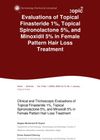 10 citations,
September 2021 in “JAMA Dermatology”
10 citations,
September 2021 in “JAMA Dermatology” Different types of persistent hair loss after chemotherapy respond differently to treatments.
9 citations,
May 2021 in “Frontiers in aging neuroscience” Taking triterpenoids from Ganoderma lucidum over a long time can help slow down brain aging and improve overall health in mice.
[object Object] 8 citations,
July 2020 in “BMC genomics” The research found genes that change during cashmere goat hair growth and could help determine the best time to harvest cashmere.
5 citations,
January 2015 in “Case reports in medicine” A baby was diagnosed with IFAP syndrome due to a new genetic mutation, showing severe skin and developmental issues.
3 citations,
August 2022 in “International Journal of Molecular Sciences” COVID-19 can cause hair loss, and treatments like PRP and stem cells might help.
 3 citations,
July 2022 in “Indian journal of dermatology, venereology, and leprology”
3 citations,
July 2022 in “Indian journal of dermatology, venereology, and leprology” Patients with alopecia areata have higher oxidative stress and lower antioxidant levels.
 3 citations,
April 2022 in “Clinical, Cosmetic and Investigational Dermatology”
3 citations,
April 2022 in “Clinical, Cosmetic and Investigational Dermatology” Different methods, including stress management, healthy diet, supplements, and treatments like minoxidil, can help hair grow back after COVID-19 related hair loss.
 3 citations,
February 2022 in “Rheumatology”
3 citations,
February 2022 in “Rheumatology” Baricitinib was effective in treating a patient with dermatomyositis and hair loss.
 3 citations,
November 2021 in “World Journal of Clinical Pediatrics”
3 citations,
November 2021 in “World Journal of Clinical Pediatrics” Vitamin D might help treat some types of hair loss, but more research is needed.
3 citations,
August 2021 in “Clinical Case Reports” Genetic testing is crucial before giving azathioprine to avoid severe side effects.
 2 citations,
May 2023 in “Plants”
2 citations,
May 2023 in “Plants” Allium hookeri extract may help promote hair growth and protect cells from damage.
 2 citations,
November 2022 in “Bioscience Reports”
2 citations,
November 2022 in “Bioscience Reports” Polycystic ovary syndrome and iron overload share similar symptoms and can be potentially treated with blood removal, diet changes, and probiotics.
 2 citations,
September 2022 in “Actas dermo-sifiliográficas/Actas dermo-sifiliográficas”
2 citations,
September 2022 in “Actas dermo-sifiliográficas/Actas dermo-sifiliográficas” For sensitive scalp, treatment is personalized and may include specific medications and hydration, while avoiding stress and irritating products.
[object Object]  2 citations,
April 2022 in “Indian Journal of Dermatology, Venereology and Leprology”
2 citations,
April 2022 in “Indian Journal of Dermatology, Venereology and Leprology” Platelet-rich plasma is a promising and safe treatment for increasing hair density and thickness in women with chronic telogen effluvium.
1 citations,
December 2023 in “International journal of molecular sciences” miR-199a-3p controls hair growth and is linked to alopecia areata.
 1 citations,
March 2023 in “Nutrients”
1 citations,
March 2023 in “Nutrients” The conclusion is that obesity should be managed with a slow, balanced approach to diet and exercise, with medication and surgery as additional options, and education and access to care are important.
 1 citations,
December 2022 in “Actas dermo-sifiliográficas/Actas dermo-sifiliográficas”
1 citations,
December 2022 in “Actas dermo-sifiliográficas/Actas dermo-sifiliográficas” Sensitive scalp causes discomfort and hair loss, treated with personalized care.
 1 citations,
September 2022 in “Journal of Medical Case Reports”
1 citations,
September 2022 in “Journal of Medical Case Reports” Rehabilitation therapy helped a severe COVID-19 patient regain muscle mass and return to normal life.
 1 citations,
January 2021 in “Journal of the Dermatology Nurses’ Association”
1 citations,
January 2021 in “Journal of the Dermatology Nurses’ Association” The convention discussed various skin conditions and treatments, and highlighted the importance of vaccinations for patients on immune-altering medications.
 January 2025 in “Dermatology Practical & Conceptual”
January 2025 in “Dermatology Practical & Conceptual” Topical finasteride is as effective and safe as minoxidil for treating female pattern hair loss.

Celiac disease requires more than just a gluten-free diet for effective management.
 December 2024 in “Nutrients”
December 2024 in “Nutrients” Skin, hair, and nail changes can help detect eating disorders early.
 November 2024 in “Journal of Clinical Medicine”
November 2024 in “Journal of Clinical Medicine” The treatment improved hair thickness, shine, and reduced hair loss effectively.
 October 2024 in “International Journal of Molecular Sciences”
October 2024 in “International Journal of Molecular Sciences” Rosa rugosa extract promotes hair growth and could be a natural treatment for hair loss.
 October 2024 in “Frontiers in Nutrition”
October 2024 in “Frontiers in Nutrition” Vitamin D deficiency is common in people with certain types of hair loss, like alopecia areata and female pattern hair loss.

Enterococcus faecalis delays wound healing by disrupting cell functions and creating an anti-inflammatory environment.
 March 2024 in “International journal of molecular sciences”
March 2024 in “International journal of molecular sciences” Zinc, copper, and iron are important for skin health and may help diagnose skin diseases.
 March 2024 in “Journal of clinical medicine”
March 2024 in “Journal of clinical medicine” Trichoscopy shows hair diameter variability, vellus hairs, and the peripilar sign are key indicators for diagnosing Androgenetic Alopecia.
January 2024 in “Diagnostics” Long COVID causes a wide range of long-lasting symptoms that change over time and are hard to diagnose and treat.
December 2023 in “Acta dermato-venereologica” Metformin might help treat certain skin conditions, but more research is needed.






















